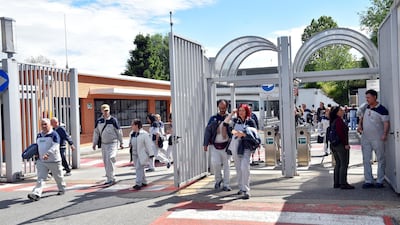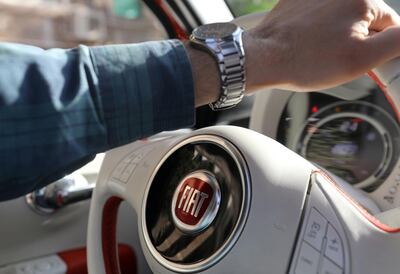Fiat Chrysler has been angling for a combination with another automaker for years, and its latest attempt - for a global tie-up with France's Renault - could address some of the main weaknesses of both companies, sources say.
But its vast Mirafiori plant in Turin, Fiat's former hometown, illustrates a major reason why no deal has happened before, and the challenges for a tie-up that could face Italian political and labour opposition to any factory closures.
Like most of Fiat Chrysler's European plants, Mirafiori is running below 50 per cent capacity. Workers have been working seven days a month on average since January, union representatives told Reuters, after sales of the Maserati Levante slumped.
The luxury SUV is the only model built at Mirafiori, and it was intended to power the plant's rebirth, bringing back thousands of assembly line workers who had been on temporary layoffs for years.
But three years after Levante's launch, those workers spoke of long waits between calls to do an extra day's work to top up their net pay of around €1,100 euros (Dh4,522) a month, having to put family holidays on hold and having mortgages refused.
"Every three to four years we are hoping that a new model will help us turn the corner ... but then after a boom we are back in furloughs or on solidarity contracts and our salary goes down by a third," said Giovanna Treccalli, a 54-year-old assembly line worker who has been with Fiat since 1987.
Furloughs are temporary leave with reduced pay, while solidarity contracts allow employers to reduce the hours of some staff.
Fiat Chrysler has highly profitable businesses in North America, with its RAM trucks and Jeep brand, but has been losing money in Europe where it may also struggle to keep pace with looming carbon dioxide emissions curbs.
Renault, by contrast, is an electric-car pioneer with relatively fuel-efficient engine technologies and a strong presence in emerging markets, but no US business.
Two sources with knowledge of the discussions told Reuters on Saturday the talks between the two carmakers were at an advanced stage. The Financial Times earlier reported the companies were discussing a deal.
Like its rivals, Fiat Chrysler faces huge costs to develop cleaner, more electric vehicles to comply with tighter global emissions rules. To help shoulder those costs, it has said it could be open to a merger or alliance.
The company has previously been approached by at least one European suitor, France's PSA Group, it came to light earlier this year, but the talks came to nothing, according to two banking sources.
A combination with a European rival and eliminating duplicate products and plants could generate - in the case of PSA - annual savings of between €3 billion and €6.6bn, UBS analysts estimate.
"Savings could be derived from the combination of platforms and plants, general R&D, overhead and procurement," they said, leaving open the specific question of Italian plant closures.
Any tie-up is however likely to face political and workforce hurdles, particularly in Italy, with layoffs and closures potentially required to boost European operating profit margins from last year's slender 1.8 per cent.
The Rome government is resisting layoffs even at Alitalia, the loss-making airline that has been burning through government loans for the past two years.
Instead Fiat Chrysler, which has 58,000 workers in Italy, is using state-subsidised furloughs and solidarity contracts to cut costs and avoid the high political and social price to the company's controlling Agnelli family of shutting a factory.
Marco Bentivogli, head of the metal mechanic branch of the CISL trade union, told Reuters his organisation was in favour, in principle, of a strategic alliance to strengthen the carmaker.
But he called for discussions with Fiat Chrysler to rule out the possibility of plant closures and job losses.
Chairman John Elkann, the grandson of Gianni Agnelli who built Fiat into a global company, has said his family is open to accepting a smaller stake in a larger entity if that made the company stronger.
But he does not want to shut down Italian plants and has been reluctant to embark on a collision course with Rome, according to three people familiar with his thinking.
A deal with an Asian buyer would not pose overlaps in Europe, but Washington is likely to vet any attempt to put Jeep or US-based Chrysler in Chinese hands.
Fiat Chrysler combined Italy's national automotive champion with the Detroit-based owner of the most distinctively American vehicle brand, Jeep.
When the company was formed in a deal brokered during the 2008-2009 financial crisis, the American side was bankrupt and the new company's leader was Sergio Marchionne, the long-time chief executive of Fiat.
The centre of gravity for the world's seventh-largest carmaker has now shifted across the Atlantic. Fiat Chrysler's North American operations, which include the Jeep SUV brand and the Ram truck, accounted for 85 per cent of profits last year.
Italy is now a central challenge for the company and its new CEO Mike Manley. Morgan Stanley values Jeep at €16.6 per share and RAM trucks at €6.6 per share, out of a price target for the whole group of 21 euros per share. That compares with a zero value for the Fiat brand and a negative one for Alfa Romeo.
Mr Manley pledged Europe would hit 3 per cent operating margins by the last quarter of this year, driven by ending costly retail practices and "a series of restructuring actions".
But Maserati and Alfa Romeo, two of the main pillars of the Europe revival plan, have failed to meet Fiat Chrysler's own expectations.
Mirafiori's 3,500 workers are hoping the arrival of an electric version of the Fiat500 minicar and a hybrid Levante next year will revive profits.
They also hope any merger will secure jobs, said 56-year-old Giuseppe Pecorino, who has been with the company for 31 years.
"They could even make us assemble bicycles as long as that will keep us working," he said.




